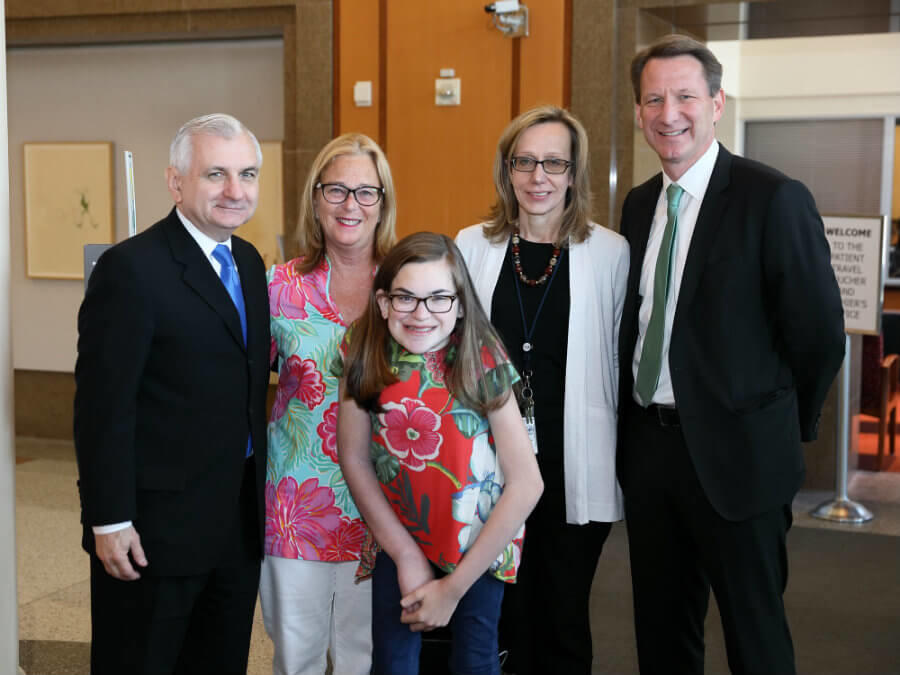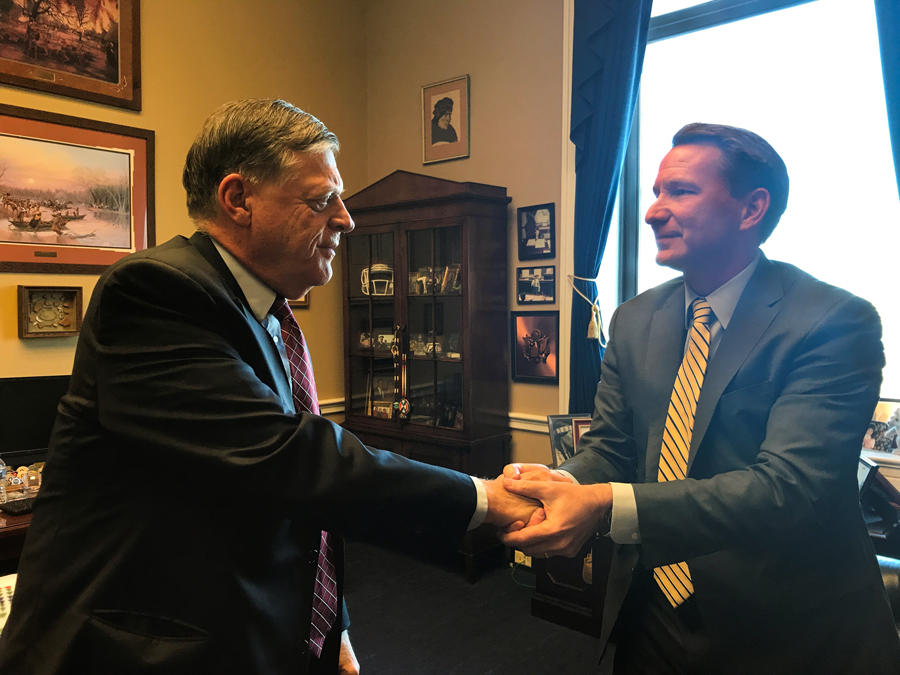Reflections on My First Year as NCI Director
, by Norman Sharpless, M.D.
October marked my one-year anniversary of having been given the honor and privilege to serve as NCI Director. It's hard to believe that it's been only a year, given everything that has transpired in that short time!
I had the opportunity to interact with many members of Congress over the last 12 months and I have been impressed by their interest in and understanding of cancer research. We are extremely grateful for the bipartisan congressional support for cancer research that was reflected in the fiscal year (FY) 2018 and 2019 appropriations for NCI, which provided increases over the previous years' appropriations.
In fact, the FY 2019 budget was the first on-time budget for NCI in more than 20 years, which is very helpful in allowing us to plan for and make decisions earlier rather than later in the fiscal year.
I am particularly excited to be leading NCI at such a critical juncture in the history of cancer research. Scientists are making new discoveries about the biology of cancer at a staggering pace, and many promising new therapies and strategies for better diagnosing and preventing cancer are emerging. This is, without a doubt, a time of great hope in cancer research.
Many important events and developments happened over the past 12 months—too many to capture here—but a few stand out for me.
Working with Congress
I have been gratified to see firsthand how engaged Congress is with NIH and how informed the individual members are about the importance of biomedical research.
Over the past year, Congress has held multiple hearings about NIH research—four of which I participated in, along with NIH Director Francis Collins, M.D., Ph.D., and NIH colleagues. Members of Congress in both the House and Senate have hosted briefings focused on cancer research, and I have met several members of Congress during their visits to the NIH campus to hear directly from NCI researchers and the patients they treat.
Although the FY 2018 appropriation wasn't enacted until late in 2018, I was pleased that the higher-than-expected funding allowed us to support additional meritorious research in high-priority areas.
Supplemental Funding
We were able to provide supplements—funds added to existing grants to cover unanticipated necessary research activities or in areas in which NCI is encouraging development of projects—to researchers and cancer centers.
Among the supplements awarded are those to:
- Conduct single-cell sequencing of pediatric, adolescent and young adult (AYA), and adult glioblastomas to better understand the tumor microenvironment
- Increase the racial/ethnic diversity of patient-derived tumor models
- Develop tools and resources to study multiple myeloma in populations experiencing disparities
- Increase uptake of colon cancer screening among southwestern American Indian tribes (with Cancer MoonshotSMSM funding)
- Uncover new methods to minimize and address the late effects of childhood and AYA cancers, with a focus on improving both the quality and the length of life for these cancer survivors
- Increase our understanding of cancer-related cachexia, an area that has not received adequate attention for many years
- Recruit and support students and investigators from populations underrepresented in the biomedical research workforce
Supporting Young Investigators
Earlier this year, I identified workforce development as one of NCI's key focus areas. And I am pleased to report that, in FY 2018, NCI exceeded its goal of funding 25% more early-stage investigators (ESIs) than in FY 2017.
We are also identifying ways to enhance the research environment for ESIs, including reducing the administrative burden around grant applications, to ensure that young scientists don't get discouraged and leave for other careers. For example, earlier this year we enhanced an existing grant mechanism—the Method to Extend Research in Time (MERIT) R37 Award—which extends the length of time that ESIs can receive funding under their first substantial independent NIH grant.
This year we were also able to implement the largest increase in almost 15 years to the Research Project Grant pool—the pool of funds available to support researchers carrying out investigator-initiated research projects.
NCI definitely has a role to play in determining areas of research needed to advance progress, but I've always believed it is important to let promising novel ideas percolate to the top; supporting creative investigator-initiated research is the best way to accomplish that.
Immunotherapy Researchers Recognized
It's wonderful stories of discovery like the evolution of immunotherapy that reinforce for me how vital it is to encourage researchers to test novel, outside-of-the-box ideas.
Many in the research community can recall a time several decades ago, when an NCI scientist, Steve Rosenberg, M.D., was pushing forward the idea of using the body's immune system to attack tumors—an idea that was often met with skepticism.
But fast forward to 2018, and Dr. Rosenberg, along with a small cadre of other researchers, including Jim Allison, Ph.D., and Carl June, M.D., are being recognized and honored for their dogged pursuit to make cancer immunotherapy not only a reality, but a true paradigm shift in cancer therapy.
In August, all three researchers were awarded the Albany Medical Center Prize in Medicine and Biomedical Research, in recognition of their groundbreaking research in immunology and advancement of immunotherapy. And in October, Dr. Allison and Tasuku Honjo, Ph.D., shared the Nobel Prize in Physiology or Medicine for their decades of outstanding research on immune checkpoint inhibition. This was the first time a Nobel Prize has been awarded for the development of a cancer therapy.
Research Progress
Although there were a number of NCI-supported studies this year that produced important findings to advance our understanding of cancer, there are a few that I want to highlight as exemplifying the broad range of research that NCI supports:
- The TAILORx trial, a de-escalation trial supported by NCI's Division of Cancer Treatment and Diagnosis, showed that chemotherapy can be avoided by about 70% of women with the most common type of breast cancer. The results mean that millions of women diagnosed with breast cancer can be spared the toxic effects of chemotherapy and the associated cost of that treatment. It's the kind of trial only NCI would support; trials focused on lowered therapeutic intensity are clearly an important topic for patients, but typically of less interest to industry.
- The genome research conducted by Andre Nussenzweig, Ph.D., and his group in NCI's Center for Cancer Research suggests that the intricate and cramped quarters of the cell nucleus make specific DNA strands of chromosomes more susceptible to breaks. If not properly reconnected, these breaks can lead to cancer. Elegant basic science discoveries like this can be so important to advancing our understanding of the biology of cancer.
- A new analysis by Mark Little, D.Phil., and his team in NCI's Division of Cancer Epidemiology and Genetics, found that cumulative exposure to low levels of radiation in children is associated with an increased risk of developing leukemia and other blood cancers. Population biology studies like this are critical to helping us improve our treatment practices to better serve patients.
- The first approval by the Food and Drug Administration of a treatment for patients with advanced forms of hairy cell leukemia was the a direct result of years of basic and translational research conducted by Ira Pastan, M.D., and his group in NCI's Center for Cancer Research and is a testament to the value of NCI's intramural research program.
- The Aspirin in Reducing Events in the Elderly (ASPREE) trial, supported by NCI and others, did not find a benefit of daily aspirin use among healthy older adults and suggested that it increased cancer deaths. This is an incredibly important study that, like TAILORx, only government would undertake.
- The initial results from the NCI-MATCH trial, an innovative precision medicine study cosponsored by NCI, offered findings of interest that are advancing efforts to develop targeted treatments for patients with certain gene abnormalities, regardless of their cancer type.
Looking Ahead
This reflection is by no means an exhaustive list of highlights of the past year at NCI. In fact, the breadth and scope of NCI's research never ceases to amaze me.
And that work is having an impact. The Annual Report to the Nation on the Status of Cancer that NCI released earlier in the year showed a steady decline in overall cancer death rates in men, women, and children in all major racial and ethnic groups, demonstrating the progress we’re making against cancer in the United States.
On the other hand, I am keenly aware of how much remains to be done. In many ways, we are still just scratching the surface of our knowledge of cancer, how it begins, how tumors interact with the immune system and other elements of their microenvironment, how to overcome treatment resistance, and a host of other critical questions.
And while Congress's support of biomedical research has led to an upward trend in annual appropriations over the last 4 years, the number of excellent ideas to advance our progress against cancer grows at an even faster pace.
These are challenges we must be prepared to face, and as NCI director, I am focused on doing everything I can to address and overcome them. I'm honored to be part of such a vibrant and dedicated community that shares these same goals.

